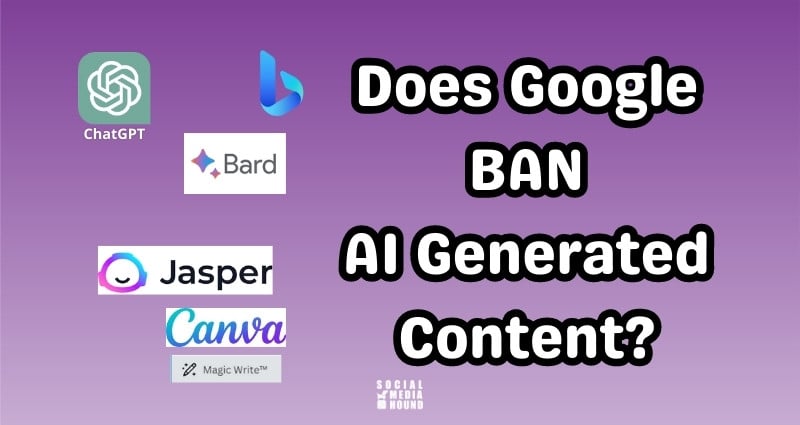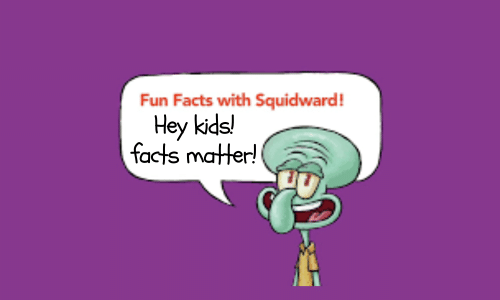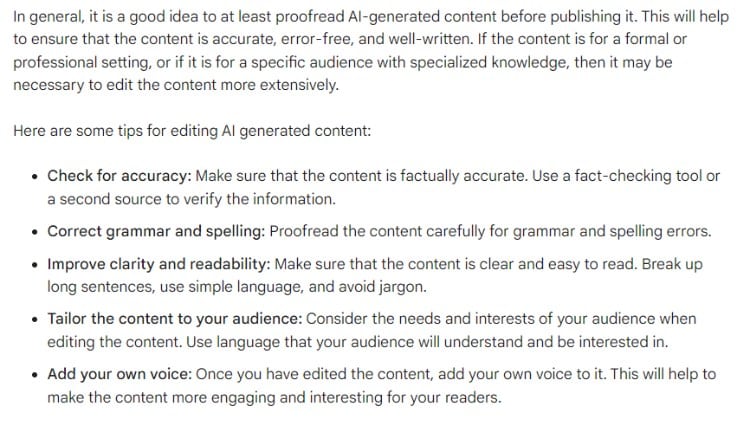
Have you caught AI Fever yet? If not, get ready! It’s coming your way – and I don’t think there’s a vaccine for it!
Whether it’s ChatGPT, Canva’s Magic Write, or another chatbot there are plenty of AI content generators out there to help write content for your blog posts, social media, website content or other marketing material. If you’re like me, you’re hearing about at least one new AI tool every day.
What does Google say about AI generated content?
With all of these AI tools out there, it only makes sense to wonder what Google has to say about all of this automated content. You may have heard any content created with AI will automatically be banned.
But wait!!
Contrary to what many think, Google does not automatically ban all AI generated content. “WHAT?” you ask, “I thought it was evil stuff sure to get me banned.”
Not necessarily. They recently updated their position on AI generated content. Here’s what they have to say . . .
“However content is produced, those seeking success in Google Search should be looking to produce original, high-quality, people-first content demonstrating qualities E-E-A-T.”
On the other hand, if you’re trying to use AI content just to game the system and rank high, think again, my friend! (That’s precisely what won’t make it into the search results.) Here’s what Google has to say about that:
“Using automation—including AI—to generate content with the primary purpose of manipulating ranking in search results is a violation of our spam policies.”
Write for people first
Even though Google is a machine we’ve all learned to love and hate, the fact is, we need to make sure our writing is user-centered. And that means taking an ethical approach to providing high-quality, trustworthy content. Doing this means we can gain the trust of both search engines and users.
Edit your AI generated content
Even though Google isn’t necessarily going to ban your content if you get some AI help, it’s a good idea to edit any AI generated content.
Why is this?
You want your writing to reflect you personally, or your brand. If you would normally infuse a little humor, something would feel ‘off’ to your regular audience if your next blog post read like a legal document. If your writing is more business-like, you want to be sure anything you publish sounds consistent.
The thing is, you know your audience (the chat bot doesn’t) so you’ll have a better idea of what type of language they resonate with. And the bottom line is, if it doesn’t resonate with the people you want to connect with, what’s the point?
Make sure the “facts” are factual
Part of the E-E-A-T guidelines is to cultivate a sense of trust by your audience. If they know you have a history of checking facts and giving them reliable information, it’s going to make Google happy. But, if you’re just rambling on about things that make no sense or have nothing to back them up, Google won’t be as likely to recommend your stuff. The more you can build that trust, the better off you’re going to be.

So pay attention to the facts! Whenever a chatbot presents something as fact, you want to make darn sure it’s giving you accurate information. Don’t just assume it’s right. Do some investigating and find some reputable sources to back up the info you’re given. Where appropriate, link to a reputable source, to let Google (and your readers!) know where they can find that info.
(There’s more to E-E-A-T, but I’ll save that for another blog post.)
What does ChatGPT say about editing content?
I even consulted my buddy, ChatGPT about this. When I asked “should I edit AI generated content” here is the (unedited) response I got:
“I recommend editing AI-generated content to ensure it aligns with your specific needs and objectives. While AI-generated content can provide a valuable starting point, it may not always capture your unique voice or fully address your target audience’s preferences.
Edit the content to reflect your unique voice and meet your goals, but also leverage the benefits of AI to save time and generate a solid foundation for your edits.”
I also posed the same question to Google Bard, and the answer I got was pretty much the same as ChatGPT’s. Here’s Bard’s response:

So, even an AI chatbots say to edit the content!
Ultimately, AI can be an excellent way to get some help, but don’t rely on it to generate all of your content. Think of it as a way to get started and then add your own personal touch, facts, and information to make it your own.
If you think about it, Google isn’t saying anything new. They’ve always wanted us to provide people with the best, most reliable, and factual content possible. So your best to make your content unique and helpful, and you’ll have a much better chance of having Google recommend it to people who are searching on that particular topic.
Learn more from Google
You can read more about Google’s position on high quality content and AI generated content here: Google Search’s guidance about AI-generated content.
Join the newsletter
Subscribe to get my latest content by email.

I do use AI-generated content, love it, but I use it as an assistant. Truly it isn’t going anywhere! my joke about using it is that years ago I went into the military and was an Intelligence analyst, then recently?!?! or not so recently I was introduced to AI and I must be honest my audience no matter how small has double in weeks instead of years to get to half the number It is today!
I do use AI in blog posts, emails, products, writing, but as an assistant. Although, I was a 96B in the army, ahem, that MOS no longer exists.Intel analysts are now 37F’s. THe higher the number the tougher the MOS is- almost like a grade. I suppose there are few if any intelligent young people out there. So to recruit into the MOS(military Occupational Speciality)they needed to lower the numbers for the position?!?!?!?! And yes, I did have the highest clearance in the USA- Top Secret with SSI access- I believe they added a third category since. My clearance was the same as the Presidential clearance! No joke!
Ok, I am concerned about AI, and where it will go but honestly do not think Google will ban AI anytime soon! People like myself use it as a guide- an assistant when stuck in creation mode and carefully edit and go through factual information for accuracy and all!
a lot of Intelligence is gathering info from other sources and knowing what is a good source vs bad source and so forth. Say your doing a story on Cancer in dogs. While a trainer may have great information on Cancer in dogs, a veterinarian will be a better source to get your information from, etc…
Right, Using AI to come up with an outline and doing your own research or extended research is a great way to write a blog post that will help answer unanswered questions your audience has. I am setting out to post everyday until September 21st. To get me through god awful Summer for one. To look to grow my audience and to help me create everyday and get into a mode. I still try to reach out to others on a daily basis and talk one on one, be it in person- over the phone- facetime/ Zoom- email, etc because communication is important. I opened up a spot in my backyard to openly talk more with my neighbor Mr Quinn for instance and let our dogs sniff each other freely and safely through the chain link fence! So yeah unfortunately there is really no replacement for actual connections with others.
I think your point about using AI as an assistant is right on!